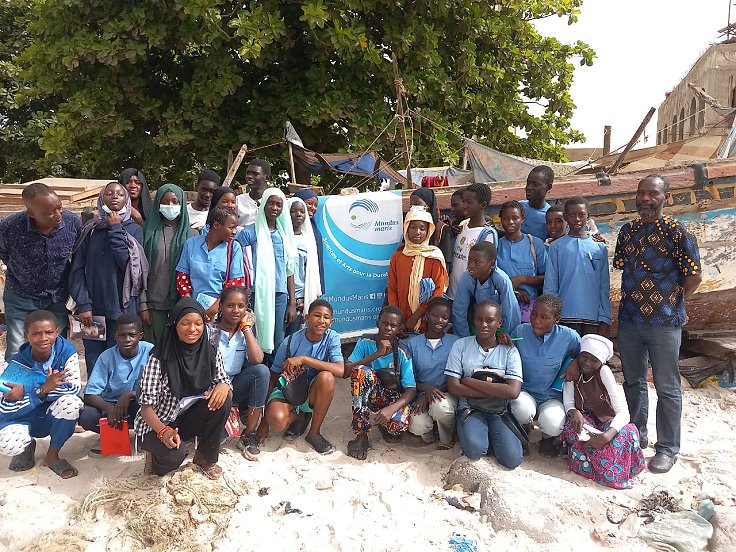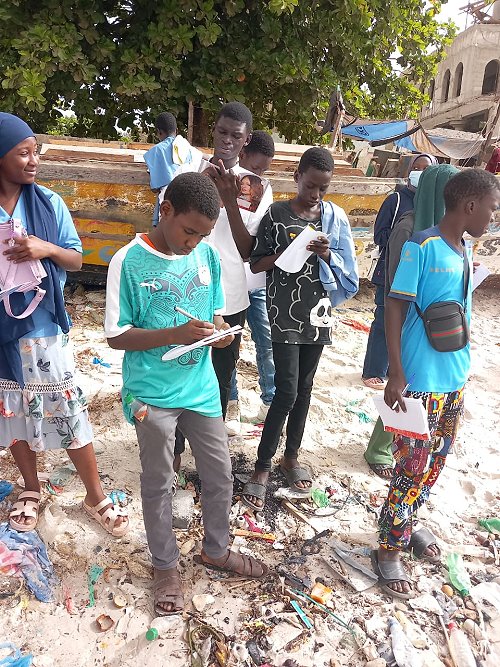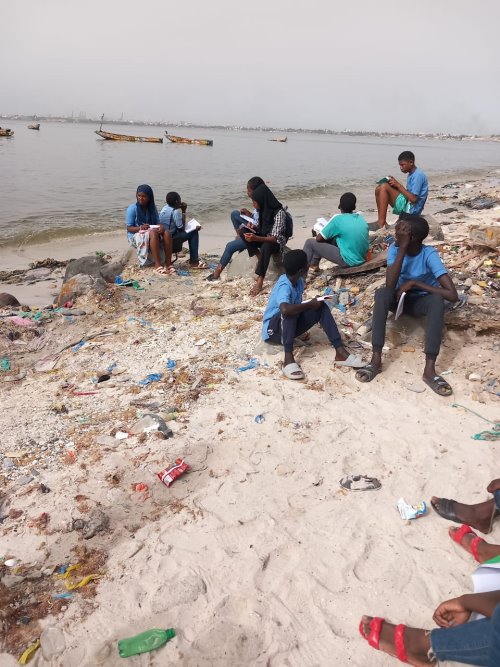World Ocean Day with the Kawabata Yasunari School in Hann, Senegal
Collaboration around World Ocean Day with Mundus maris has become already something of a tradition with the Kawabata Yasunari School in Hann, Senegal. The Director, Mr. Baila Wane, had opted for an excusion of 30 pupils to the beach in Hann Bel Air, more specifically to the vicinity where waste waters of Dakar and the port are discharged into Hann Bay. From an educational point of view a direct experience generates greater learning effects than reading a book in class. Moreover, most pupils are from well-to-do families hailing from a residential area and thus are not often exposed to the pollution the people in the fishing part of the municipality experience on a daily basis. So hiring a bus on 10 June to take an entire class to a beach in Hann Bay was a welcome break with ordinary 'intra-muros' learning, accompanied also by two more teachers, Mr Dème and Mrs Mbaye.
The beach lesson focused on the ubiquitous pollution and other threats to ocean health and public health. Not only were large quantities of plastic bags and other objects littering the beach, but Mr. Wane also explained how degraded plastic found its way through the ocean food web back onto every fish eater's plate. He also explained the problem of sand mining for housing constructions that could even lead to erosion of some houses constructed very close to the water level.

After more explanations and questioning the keen pupils were ordered to write down all their observations about the beach conditions into their notebooks so as to keep track of the problems they had identified and also add some suggestions as to overcome them.
Back in school, at the end of the excursion, the teachers organized a review session for the pupils. According to the teachers, in line with the methodology used by the team that supervised the excirsion and set goals, this review ended with interesting results. The benefits are of many kinds:
First, the overwhelming majority of the students, who came from the Marist neighbourhood where the school is located, were very touched by what they saw. In particular, they were shocked to see that there are children their age, like them, who are living in these quite unacceptable environmental conditions day-in, day-out. This was the first feeling to emerge.
Second, the classroom exercise also included a reporting phase on the causes of pollution, its consequences and the solutions to be envisaged. This exercise took place on the basis of a chart prepared beforehand and distributed to the students. The three major drivers of the pollution listed are (a) the households that are the residents of the Bay of Hann, (b) the industries that discharge from the capital Dakar, and (c) the Society of Animal Industries of Senegal (SERAS).
Third, as for the consequences of the pollution, the pupils talked about the low oxygen of fish habitat, the scarcity of fish, and the fishing crisis. So, the participants in the field trip to Hann Bay were able to make the link for the first time between the crisis of artisanal fishery in connection with the degradation of ecosystems and the emigration of people taking the hazardous journey in the pirogues to reach Europe. They also reported on the environmental effects of marine sand extraction for construction. The students' on-site observations where houses were carried away by the rising sea level were thus explained during the excursion by impacted adults.
Fourth, they touched at least lightly on the plans to clean up Hann Bay hoping to restore it at least partially to its former glory.
In the opinion of director, Mr Wane, and the teachers, Mrs Mbaye and Mr Dème, the educational excursion was a great success. Indeed, it is the first time in the collaboration with Mundus maris that this school organizes an educational outing with 30 pupils on the theme of pollution. The feelings expressed by the students when they returned to class, demonstrates that raising awareness of the scourge has been achieved. The teachers appreciate the expression of solidarity with their peers suffering from the pollution as one of the most important benefits. Cleaning up the Bay has also grabbed international headlines.
There is nothing like combining factual knowledge with artistic expression and being close to the sea - true to this year's UN motto for World Ocean Day 'Awaken new depths'.
 |
 |
| Students recording their observations | No escaping the litter on the beach |
After expressing their satisfaction with the partnership with Mundus maris and the benefits of the excursion, the teachers wanted to make recommendations for the continuation of this collaboration. To produce more tangible results they made proposals that revolve around three axes:
First, the teachers strongly insisted on the need to have activities with Mundus maris not only once a year. They believe that marine pollution is a scourge that deserves to be addressed more substantially during the entire school year. Moreover, World Ocean Day falls into the very difficult period of the preparation of the tests and level controls before the end-of-year exams.
Second, they expressed the need for educational materials such as posters and videos specific to the functioning of the oceans in its links with artisanal fishing in general and on ocean pollution (social factors and consequences) specifically.
Finally, the Kawabata Yasunari school would like to explore with Mundus maris how it could play a leadership role at the level of the municipality of Hann Bel Air, by gradually enrolling the other educational institutions of the locality towards a network able to carry this type of work as an ongoing initiative. They would like to study the feasibility of this ambition with Mundus maris, in particular a mission statement and the conditions for the establishment of this network for engaging a more regular collaboration with other schools.








